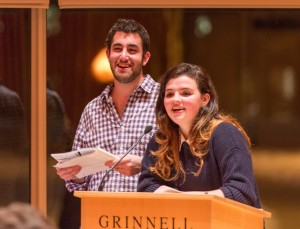This Thursday, Dec. 12, the 46th edition of the Grinnell Review was released to the general public. For editors Quinn Underriner, Emily Mester and Drew Ohringer [all ’14], the compilation of literary and artistic submissions by Grinnell students is the culmination of a semester’s hard work, and although the undertaking was at times daunting for the three first-time chief editors, they tried to preserve a sense of humor in their efforts.
“We tried to inject a sense of playfulness into it … although the writing itself is still serious,” Ohringer said.
Mester expressed a desire to make the Grinnell Review a more visible part of campus life, but also touted the benefits of working with a smaller publication, positing that its size made the Grinnell Review better able to include niche interests.
“I think part of the benefit of having a literary magazine that’s not a big [institution] … is you can play around a little more, and make it more representative of a distinct taste or aesthetic sensibility,” Mester said.
The guiding principle for this edition of the Review, the editors agreed, was the prototypical LitBro, defined by Mester as “someone who wears plaid and lost their virginity once and keeps writing about it. They probably like Radiohead a lot. They write poetry, but they’re still bad boyfriends.”
Also cited as influences for the new edition of the Review were pop culture and the internet, but for Underriner, being an editor means seeking a balance between developing the Review’s unique voice and maintaining professionalism.
“We want to walk that line, because we do take this very seriously and want this to be a serious, respected publication,” he said.
All three editors encourage any student interested in literary or visual arts to submit their work for next semester’s edition of the Grinnell Review and to contact them for help on developing their pieces. They all agree that seeing your own words in print is incredibly rewarding.
“It’s like a thing that you can point to that you have created,” Underriner said. “This avenue doesn’t really exist for most people once you graduate college, and it’s pretty incredible.”




















































